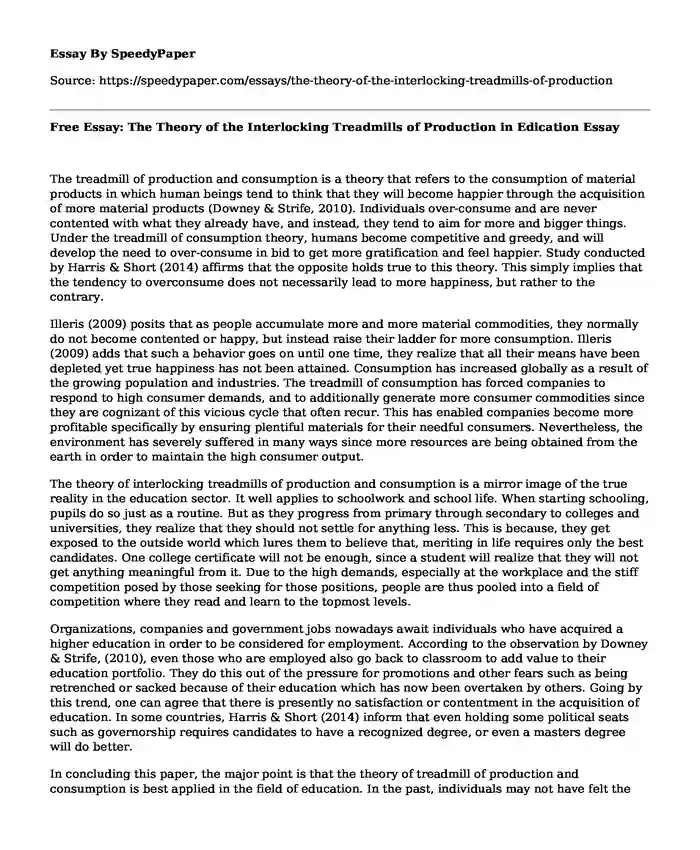
| Type of paper: | Essay |
| Categories: | Learning Education Employment |
| Pages: | 3 |
| Wordcount: | 644 words |
The treadmill of production and consumption is a theory that refers to the consumption of material products in which human beings tend to think that they will become happier through the acquisition of more material products (Downey & Strife, 2010). Individuals over-consume and are never contented with what they already have, and instead, they tend to aim for more and bigger things. Under the treadmill of consumption theory, humans become competitive and greedy, and will develop the need to over-consume in bid to get more gratification and feel happier. Study conducted by Harris & Short (2014) affirms that the opposite holds true to this theory. This simply implies that the tendency to overconsume does not necessarily lead to more happiness, but rather to the contrary.
Illeris (2009) posits that as people accumulate more and more material commodities, they normally do not become contented or happy, but instead raise their ladder for more consumption. Illeris (2009) adds that such a behavior goes on until one time, they realize that all their means have been depleted yet true happiness has not been attained. Consumption has increased globally as a result of the growing population and industries. The treadmill of consumption has forced companies to respond to high consumer demands, and to additionally generate more consumer commodities since they are cognizant of this vicious cycle that often recur. This has enabled companies become more profitable specifically by ensuring plentiful materials for their needful consumers. Nevertheless, the environment has severely suffered in many ways since more resources are being obtained from the earth in order to maintain the high consumer output.
The theory of interlocking treadmills of production and consumption is a mirror image of the true reality in the education sector. It well applies to schoolwork and school life. When starting schooling, pupils do so just as a routine. But as they progress from primary through secondary to colleges and universities, they realize that they should not settle for anything less. This is because, they get exposed to the outside world which lures them to believe that, meriting in life requires only the best candidates. One college certificate will not be enough, since a student will realize that they will not get anything meaningful from it. Due to the high demands, especially at the workplace and the stiff competition posed by those seeking for those positions, people are thus pooled into a field of competition where they read and learn to the topmost levels.
Organizations, companies and government jobs nowadays await individuals who have acquired a higher education in order to be considered for employment. According to the observation by Downey & Strife, (2010), even those who are employed also go back to classroom to add value to their education portfolio. They do this out of the pressure for promotions and other fears such as being retrenched or sacked because of their education which has now been overtaken by others. Going by this trend, one can agree that there is presently no satisfaction or contentment in the acquisition of education. In some countries, Harris & Short (2014) inform that even holding some political seats such as governorship requires candidates to have a recognized degree, or even a masters degree will do better.
In concluding this paper, the major point is that the theory of treadmill of production and consumption is best applied in the field of education. In the past, individuals may not have felt the pressure for the need to acquire a higher education since it was easier finding employment, which is opposite of the current workplace.
References
Downey, L., & Strife, S. (January 01, 2010). Inequality, Democracy, and the Environment. Organization & Environment, 23, 2, 155-188.
Harris, R., & Short, T. (2014). Workforce development: Perspectives and issues. New York: Springer.
Illeris, K. (2009). Contemporary theories of learning: Learning theorists -- in their own words. London: Routledge.
Illeris, K. (2009). Contemporary theories of learning. London: Routledge.
Cite this page
Free Essay: The Theory of the Interlocking Treadmills of Production in Edication. (2019, Sep 23). Retrieved from https://speedypaper.com/essays/the-theory-of-the-interlocking-treadmills-of-production
Request Removal
If you are the original author of this essay and no longer wish to have it published on the SpeedyPaper website, please click below to request its removal:
- Free Essay: Demystifying Bertha's Psychopathic Tendencies
- Free Essay Sample: Lifting the Crude Oil Export Ban
- Comparative Political Economy, Free Essay
- Essay Example about 1950s-1970s Social Movements
- Essay Sample on Health Care Funding in United States of America
- Free Essay Sample on Hydrogen Cyanide Handling and Safety Measures
- Missed Nurse Care by Beatrice J. Kalisch, PhD, RN, FAAN
Popular categories




